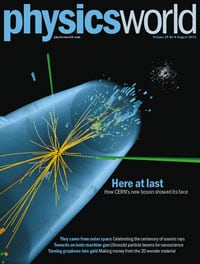By Matin Durrani

Now that the dust has settled on CERN’s historic discovery of what looks very much like a Higgs boson, why not settle back and enjoy the August 2012 issue of Physics World. In a series of special Higgs-boson-related sections, we explore the implications of the discovery, offer a selection of amusing behind-the-scenes tales about CERN’s big announcement on 4 July, while Michael Riordan looks back at how the Higgs boson was predicted and the first quarter century of experimental searches for it. The digital magazine also includes access to a fabulous new Physics World podcast, “Going where the beam is good”, about the ups and downs of a career in particle physics.
Elsewhere in the issue, Alan Watson celebrates the centenary of cosmic rays, Kevin Weatherill and Edgar Vredenbregt describe how ultracold particle beams could transform nanoscience, while Physics World columnist Robert P Crease looks back at this summer’s historic transit of Venus. Plus reviews, careers, lateral thoughts, feedback and much more.
Members of the Institute of Physics (IOP) can access the entire new issue online through the free digital version of the magazine by following this link or by downloading the Physics World app onto your iPhone or iPad or Android device, available from the App Store and Google Play, respectively.
For the record, here’s a rundown of highlights of the issue:
• CERN finds evidence for new boson – Hamish Johnston explains how attention is now being focused on finding out more about the new boson’s properties
• Japan frets over ‘Galapagos syndrome’ – With worries that Japan’s research is becoming isolated, it is hoped that new initiatives will reverse the trend, as Dennis Normile reports
• Introducing the higgson – Gordon Fraser and Michael Riordan argue that the boson discovered at CERN should be known not as the Higgs boson, but the “higgson”
• Critical point: Transit watching – Robert P Crease reports on the result of four new experiments in “historical astronomy”
• The long road to the Higgs boson – Michael Riordan looks back at how this long-sought particle was predicted and the first quarter century of experimental searches for it
• 100 years of cosmic rays – A century on from the discovery of cosmic rays, Alan Watson relates how physicists have gradually revealed the nature of these mysterious objects, and examines progress in understanding where cosmic rays come from and why they tail off at high energies
• The next coolest thing – Over the past 25 years, laser cooling and trapping have transformed experimental atomic physics. Kevin Weatherill and Edgar Vredenbregt describe how ultracold particle beams could soon do the same for nanoscience applications
• A Cold War puzzle persists – Istvan Hargittai reviews The Pontecevoro Affair: a Cold War Affair and Nuclear Physics by Simone Turchetti
• ESP and LSD on the CIA’s dime – Andrew Whitaker reviews How the Hippies Saved Physics: Science, Counterculture and the Quantum Revival by David Kaiser
• Making the ‘wonder material’ – Graphene is taking the world of physics by storm, with new applications cropping up almost weekly. Daniel Stolyarov describes how he and his wife, Elena Polyakova, turned the graphene boom into a business
• Once a physicist: Olaf Olafsson – Meet the executive vice-president for international and corporate strategy at Time Warner, whose fourth novel, Restoration, was published in February
• A brief geography of time – In this month’s Lateral Thoughts column, Gareth Leyshon muses on the awkwardness of Earthly calendars
If you’re not yet a member, you can join the IOP as an imember for just £15, €20 or $25 a year via this link. Being an imember gives you a full year’s access to Physics World both online and through the apps.



